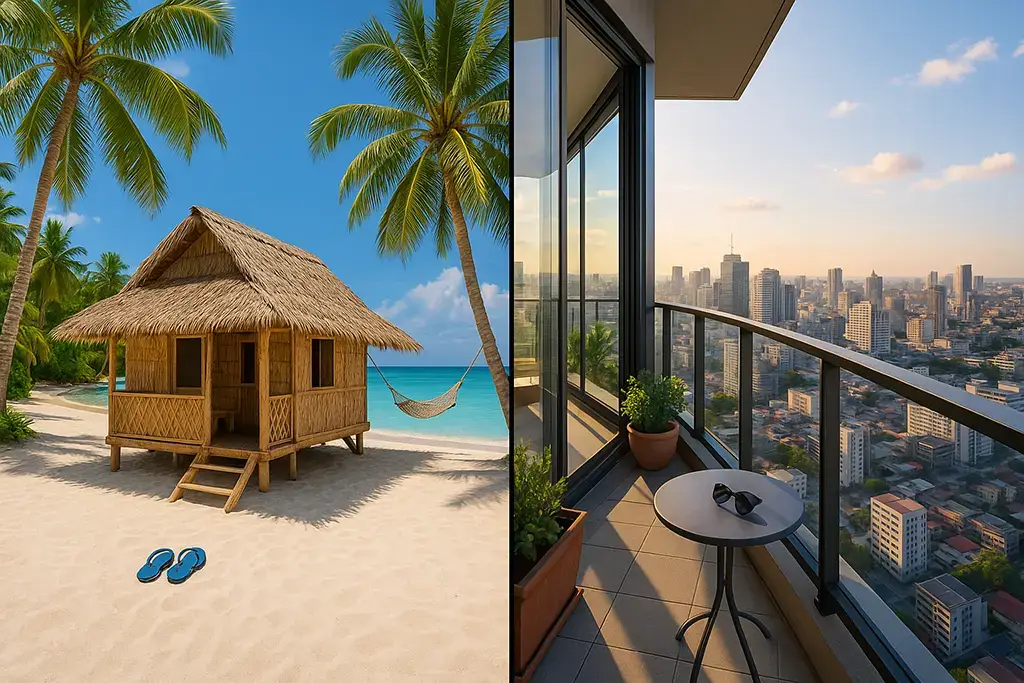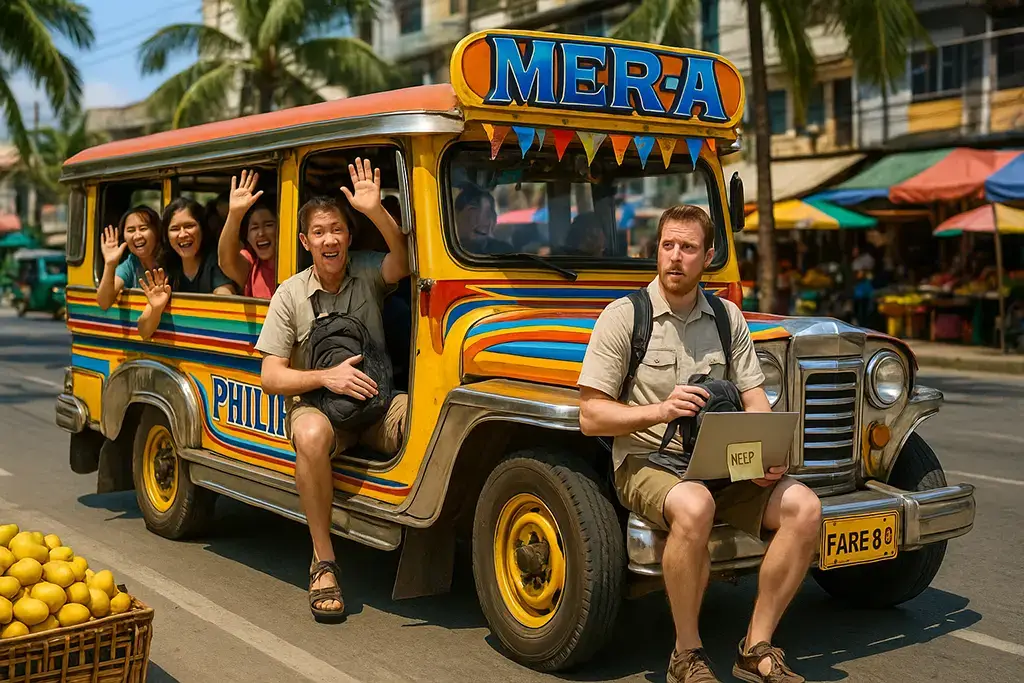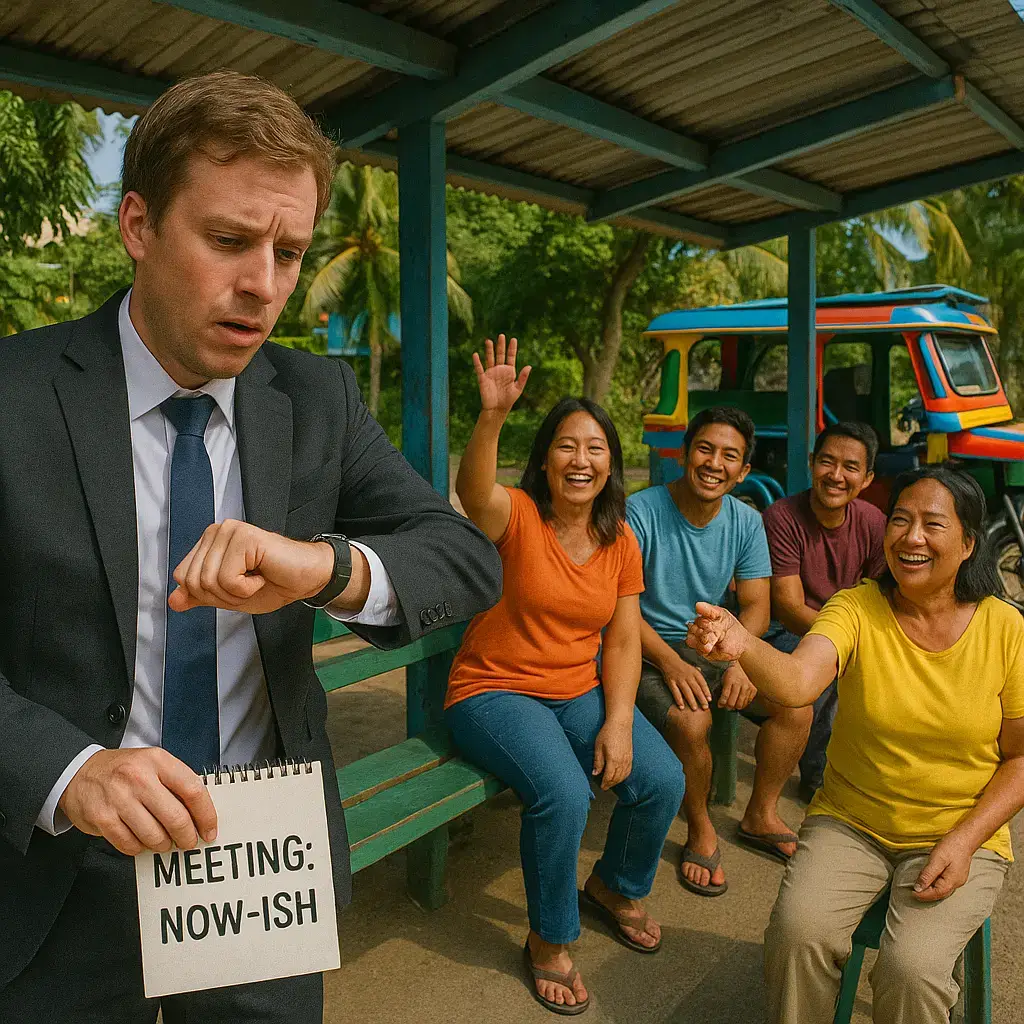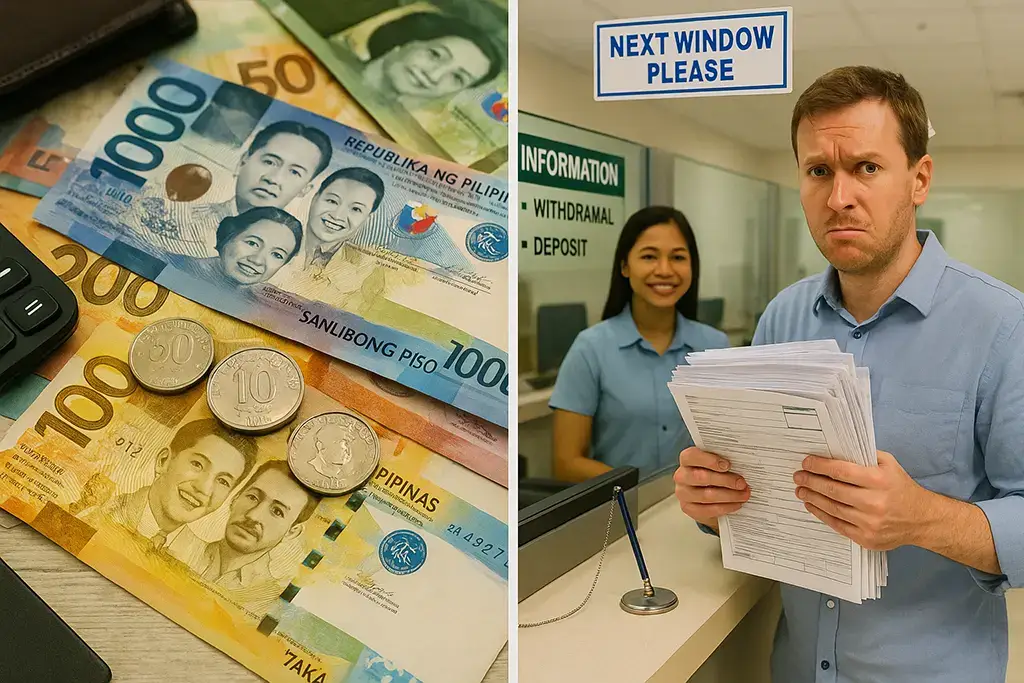
Introduction – Why the Philippines?
Are you dreaming of living in the Philippines as an expat, but also wondering if you’ll end up on a beach sipping fresh coconut or just stuck in Manila traffic? Welcome to the most entertaining and informative expat guide to the Philippines you’ll ever read. If you’ve ever googled “should I move to the Philippines?” or asked yourself “can I survive the karaoke nights and the cost of living in the Philippines?”, then friend, you’re in the right spot.
Moving to the Philippines is like hitting the “refresh” button on your life—only this version includes 7,000+ islands, a love affair with mangoes, and the kind of healthcare in the Philippines that’ll make your insurance back home look like a knock-off. Whether you’re craving warm beaches, lower bills, or want to escape the soul-sucking winter, expat life in the Philippines delivers endless sunshine and, yes, a few surprises.
The Allure of 7,000+ Islands

Why do so many people opt for expat life in the Philippines over other tropical destinations? Because living in the Philippines as an expat means you get front-row seats to nature’s ultimate variety show. Want a taste of the best places to live in the Philippines for expats? Start island-hopping! From Boracay’s white sand to Palawan’s jaw-dropping lagoons, you’ll quickly see why moving to the Philippines is a popular bucket-list dream.
Every island is different, and every day is an adventure. Whether you’re climbing the Banaue rice terraces or searching for the secret beaches of El Nido, there’s always something new. If your goal is finding housing in the Philippines with a killer sea view and a price tag that doesn’t require a second mortgage, you’re in luck—paradise is often surprisingly affordable!
Filipino Hospitality – Myth or Fact?
Let’s set the record straight: Filipino hospitality isn’t just something you read about in expat guides to the Philippines—it’s a superpower. Living in the Philippines as an expat means you’ll instantly notice the warmth, generosity, and (sometimes overly) curious locals who want to know your name, your life story, and possibly your blood type. Expect to be fed, fussed over, and forced into impromptu karaoke competitions.

The friendliness isn’t just surface-level. If you want to make friends in the Philippines as an expat, all you need is a smile and a willingness to try lechon. Whether you’re invited to a fiesta, a family gathering, or to “eat, eat, eat!”—embrace it. Filipino hospitality is your golden ticket to the most memorable expat experiences in the Philippines.
The Cost of Living – Can You Afford Paradise?
Before you pack your bags and Google “cheapest places to live in the Philippines,” let’s talk about the cost of living in the Philippines as an expat. Is it as affordable as they say, or is there a hidden mango tax? Spoiler: If you know how to live like a local, you can enjoy beachfront bliss on a budget, but imported cheese will still cost you an arm and a leg.
Housing – From Beach Huts to Luxury Condos

One of the top concerns for expats moving to the Philippines is, naturally, where you’ll live and how much it’ll cost. The good news? Finding housing in the Philippines comes with more options than a buffet at a fiesta. If you want a bamboo nipa hut a stone’s throw from the beach, you’ll find it for $200–$500 per month. If you prefer city life, a modern condo in Manila, Cebu, or Davao will cost you $400–$1,200, complete with a pool, gym, and (usually) air conditioning.
Don’t be shy about negotiating your rent—most landlords expect it, and it’s a rite of passage for expats. Just remember: when you’re searching for the best places to live in the Philippines for expats, factor in location, safety, and your distance from the nearest mall (very important, trust me). Utility bills are reasonable, unless you run your air con like it’s a freezer for ice cream—and who can blame you?
Utilities & Internet – Staying Cool and Connected
A significant portion of the cost of living in the Philippines for expatriates is their utilities. Let’s say electricity in the Philippines isn’t cheap, especially if your idea of “living the dream” is air-conditioned bliss 24/7. Water is affordable, but only drink the bottled stuff unless you’re craving an adventure that involves a lot of time in the bathroom.

Now for the most modern of survival essentials: the internet. If you need blazing-fast speeds for your remote job, consider areas like Manila, Cebu, or major urban centers. If you move to a remote island, prepare for spotty Wi-Fi, “digital detox,” and the very real possibility that your favorite series will buffer forever. Budget $20–$50 a month for internet and always have a backup SIM card ready for those unexpected “brownouts.”
Groceries & Eating Out – Mangos, Lechon, and More
Food is a huge part of expat life in the Philippines. Grocery shopping can be cheap if you love local fruits, fish, and veggies. Wet markets are a gold mine for budget-friendly produce, but if you crave imported peanut butter or French cheese, be prepared to pay a premium. The cost of living in the Philippines as an expat goes way down if you skip the imported aisle and fill your basket with mangos, bananas, and a mountain of rice.

Dining out is a national sport—so why not join in? Street food, carinderia (local diners), and fast food will keep you fed for a few dollars a day. If you’re more into fine dining, major cities boast everything from Italian to Japanese cuisine, usually at half the price you’d pay back home. Just don’t leave the Philippines without trying lechon, adobo, and—if you’re brave—balut. After all, every expat guide to the Philippines will tell you: “When in doubt, eat what the locals eat!”
Transportation – Jeepneys, Tricycles, and the Art of Patience
Getting around as an expat in the Philippines is half the adventure (and sometimes, half the stress). Jeepneys are the classic choice for budget transportation, offering you the unique chance to sit knee-to-knee with strangers and practice the art of patience during Manila’s world-famous traffic. Tricycles and habal-habal (motorbike taxis) are perfect for short trips or if you want your daily commute to feel like an amusement park ride.
Taxis and Grab (the Southeast Asian answer to Uber) are available in bigger cities, and inter-island flights are dirt cheap—don’t expect things to run on time. Transportation is a significant factor in the cost of living in the Philippines, but if you’re willing to be flexible, you’ll save a considerable amount (and gain a lifetime supply of “wild ride” stories).

Healthcare in the Philippines – Is It Safe to Get Sick?
If you’re researching healthcare in the Philippines for foreigners, good news: you don’t need to be a daredevil to survive here. The country boasts a mix of public and private hospitals, a plentiful supply of English-speaking doctors, and pharmacy shelves that resemble those back home.

Public vs. Private Hospitals – The Real Differences
Let’s be real: private healthcare in the Philippines is the preferred option for most expats. Public hospitals are affordable but often crowded and lacking the bells and whistles. Private hospitals in cities like Manila, Cebu, and Davao offer high-quality care, English-speaking staff, and shorter wait times. Healthcare in the Philippines for expats is generally reliable, provided you have insurance and know where to go.
Always keep some cash on hand; even private hospitals often want a deposit before treatment. A smart expat knows the nearest reputable hospital before settling down in a new town. It’s an underrated but crucial tip in every expat guide to the Philippines.
Health Insurance – Your Safety Net (or not)
If you only take away one thing from this expat guide to the Philippines, let it be this: GET HEALTH INSURANCE. Sure, the cost of living in the Philippines is low, but a surprise hospital bill can still blow your budget. International plans are the safest bet, but there are also numerous local health insurance options available for expats.
PhilHealth, the government insurance, is available to expats with the correct visa, but don’t expect it to cover everything. Private insurance gives you the flexibility and coverage you’ll need, especially if your karaoke performances end in an unexpected injury (it happens more often than you think).
Pharmacies & Medications – Where to Find What
Need meds? Pharmacies are readily available throughout the Philippines, and most medications can be purchased over the counter. Generics are affordable, but imported brands can get expensive—another sneaky cost of living in the Philippines for expats. Bring a stash of essentials and always check that your favorite allergy meds are available locally.
Don’t be surprised if the pharmacy staff wants to know exactly what’s wrong with you—they’re just being thorough (and a little nosy). If you’ve got questions, don’t hesitate to ask. Filipinos are happy to help and may even recommend their favorite over-the-counter medication, such as a cough syrup or painkiller.
Lifestyle in the Philippines – Living the Dream?
Welcome to the part of the expat guide to the Philippines where life goes from “is this real?” to “how can I ever leave?” Whether you’re here for the sun, sea, or just the world’s sweetest mangos, expat life in the Philippines is equal parts paradise and “I can’t believe this is my life.” Every day brings something new—some days you’re swimming with whale sharks, other days you’re wondering why your neighbor’s rooster is practicing opera at 3 a.m.

Making Friends – Are Filipinos the World’s Friendliest People?
If you’ve been reading about Filipino hospitality in every expat blog, believe the hype! Living in the Philippines as an expat means being welcomed by neighbors who treat you like family, random strangers who want to practice their English, and new friends who’ll insist you join them for every birthday, wedding, and “let’s eat because it’s Tuesday” party.
Making friends in the Philippines as an expat is hilariously easy. Attend a local fiesta, sign up for a dance class, or wander into a karaoke bar and belt out your best version of “My Way.” You’ll have a dozen new besties by dessert. It’s a great way to learn local customs, swap expat stories, and be invited to places you never even knew existed.
Nightlife & Entertainment – Beyond Karaoke Bars
Sure, karaoke is the national sport (and you will be judged for your song choice), but the entertainment scene is far from one-note. Expat life in the Philippines means everything from rooftop bars in Makati to beach bonfires in Siargao. Want to catch the latest Marvel movie? The malls are massive, modern, and air-conditioned—a win for your entertainment AND your survival in the tropical heat.
If you’re looking for something a bit more offbeat, there are open mic nights, drag shows, local festivals, and spontaneous street parties. Just remember, if you hear loud music and see a crowd, you’re probably welcome to join—bonus points if you bring snacks.
Fitness & Outdoor Activities – Surf, Sand, and Sore Muscles

When it comes to staying active, expats living in the Philippines have you covered. Into surfing? Siargao is your new home. Love diving? Head to Cebu or Palawan and swim with the turtles. If you prefer to stay above water, hiking up volcanoes or through lush jungles will give you those “Instagram-worthy” moments (and some serious leg muscles).
Even city dwellers have options: gyms, yoga studios, basketball courts, and—yes—even Zumba in the park. The hardest part about fitness in the Philippines isn’t finding activities; it’s saying no to yet another feast afterward. (It’s not your fault if your neighbor’s Lola insists you try her homemade halo-halo “for energy.”)
Culture Shock – The Good, The Weird, and The Hilarious
Every expat guide to the Philippines will tell you to expect culture shock. But honestly, half the fun of expat life in the Philippines is the stuff that makes you laugh, scratch your head, and call your friends back home to say, “You’ll never believe what happened today!”
Filipino Time – Always “A Little Late”

Here’s a quick Filipino culture shock: time doesn’t tick the same way here. If someone says, “I’ll be there in 10 minutes,” use exponential math and multiply that by three. Living in the Philippines as an expat means learning to love “Filipino time”—a magical concept where everything is a little bit late, but nobody’s ever mad about it.
Eventually, you’ll adapt. You’ll show up late and realize you’re still the first one there. You’ll even start to relax and discover the world won’t end if dinner begins at eight instead of six. Welcome to island time, friend!
Local Customs & Etiquette – What Not to Do
While expat life in the Philippines is laid-back, there are a few local customs to be aware of, which can help you avoid being perceived as “that foreigner.” Show respect for elders—greet them with “mano” (touching their hand to your forehead) if you’re feeling brave. Don’t point with your finger (use your lips, trust us), and never lose your temper in public.
And prepare yourself for friendly interrogation: “Are you married?” “How much do you make?” “Why don’t you have kids yet?” It’s all fair game. Just laugh it off, give a playful answer, and remember—it’s their way of being friendly. Bringing a small gift when visiting a home is also a surefire way to win hearts (and maybe score some extra lumpia).
Money Matters – Banking, Sending, and Spending
Time for every expat’s favorite subject: money! The cost of living in the Philippines for expats is famously reasonable, but navigating banking in the Philippines can feel like a never-ending episode of “Amazing Race: Paperwork Edition.”

Opening a Bank Account – Not as Easy as it Sounds
Ready to open a bank account in the Philippines? Take a deep breath, gather your passport, proof of address, visa, and about six other documents you never knew you needed. Finding a bank that caters to expats can be challenging, but once you’re set up with BDO, BPI, or Metrobank, you’ll have access to online banking, ATMs, and the occasional complimentary gift, such as a free mug.
The process takes patience, so treat it like a cultural experience (and bring snacks). Expats in the Philippines quickly learn that paperwork is a way of life, so smile, nod, and get those forms filled out. The reward? You’ll finally be able to pay your bills, transfer money, and maybe even open a savings account for all that leftover mango money.
Sending Money In & Out – The Art of Remittance
Sending or receiving money as an expat in the Philippines is a national tradition. Services like Western Union, Remitly, and Wise make it easy to send funds from abroad or help out friends and family. But be prepared for occasional delays, small fees, and some creative spelling of your name at the counter.
Withdraw cash at city ATMs (they’re everywhere), but in rural areas, you’ll need a backup stash. The good news? Filipinos are budgeting wizards, and you’ll learn how to stretch your pesos like a pro—whether you’re splurging on imported treats or saving up for your next island getaway.
Visas & Legalities – Staying Out of Trouble
Every expat guide to the Philippines eventually addresses the crucial subject of visas, paperwork, and staying on the right side of the law. Don’t worry, you don’t need to be a lawyer, just someone who loves a good checklist and has a sense of humor about bureaucracy.
Types of Visas – Finding the Right One for You
If you think living in the Philippines as an expat is as simple as showing up with a sun hat and a smile, think again! The country offers a variety of visas for expats:
- Tourist Visa (the starter pack): Arrive, get 30 days for free, then extend every couple of months—think of it as a subscription service, but with more passport stamps.
- Special Resident Retiree’s Visa (SRRV): Perfect for retirees dreaming of a beachside nap. This golden ticket comes with perks and lets you live long-term without the monthly visa run.
- Student and Work Visas: For those who want to pursue their studies or earn a living legally. Remember, working on a tourist visa is like singing “My Way” off-key at karaoke—a risky move.
Pro tip: The best places to live in the Philippines for expats usually have immigration offices nearby. And whatever you do, don’t overstay your visa. Fees can pile up faster than dirty laundry during the rainy season.
Dealing with Bureaucracy – A Test of Patience
Welcome to the Olympics of paperwork! Expat life in the Philippines means learning to love forms, passport photos, and mysterious “processing fees.” Get ready to queue, smile, and possibly make new friends in line (bonding over bureaucracy is a thing here).
- Always bring more copies than you think you need.
- Ask three people for the exact instructions, and you’ll get three answers, but one is usually right.
- Pack snacks, water, and your best “patient face.”
The reward for surviving this paper chase? A legal stay in paradise, plus enough stories to fill your next expat dinner party.
Safety & Security – Sun, Sea, and Scams
While living in the Philippines as an expat is generally safe and friendly, even paradise has its pitfalls. Relax—most issues are easily avoided if you have common sense and a healthy respect for sunscreen.
Common Scams – Learn from Others’ Mistakes
If you’re new to the country, remember: expat life in the Philippines is mostly remarkable, but a few individuals will try to take advantage of you. Classic scams include:
- The “broken” taxi meter: Always insist on using the meter or agree on a price before getting in.
- Market magic: If you look especially foreign, expect “special prices” (pro tip: bargain with a smile).
- Too-good-to-be-true tours: Book with reputable providers and ask around in expat groups for recommendations.
For the record, if someone offers to sell you an “instant residency” or the “best beach in the world”—double-check before handing over your pesos.
Staying Safe – Tips for Everyday Life
Honestly, the most significant risk for most expats in the Philippines is sunburn and overeating. Still, city dwellers should keep a close eye on their belongings, avoid sketchy neighborhoods at night, and exercise caution with their gadgets in crowded places.
- Blend in when you can.
- Don’t flash wads of cash or brand-new smartphones.
- And always, always lock your doors, even in paradise, safety first.
Most communities are tight-knit, and you’ll soon know your neighbors (and probably their cousins, aunts, and favorite basketball teams). The local expat Facebook group is a goldmine for safety tips and the latest on “where not to get mugged by a mango.”
Education for Expats’ Kids – International or Local?

Moving with the family? Expat life in the Philippines isn’t just for sun-chasing retirees—kids thrive here too! Just make sure you pick the right school, or you might be explaining why little Timmy now only wants rice for breakfast.
School Options – Making the Right Choice
For families, the best places to live in the Philippines for expats usually have good school options.
- International Schools: The gold standard. Expect British, American, or IB curricula, air conditioning, and a global crowd.
- Private Filipino Schools: Great if you want your kids to mix with locals and pick up Tagalog.
- Public Schools: Extremely affordable, but quality varies, and class sizes can be large.
Want your kid to become the next Manny Pacquiao or a karaoke superstar? The Filipino school system offers a wide range of sports, music, and events—don’t forget to budget for your costume!
Costs of Education – It’s Not Cheap, Sorry!
Let’s not sugarcoat it: international school tuition can feel like financing a small yacht. Budget $5,000–$20,000 a year for the big names. Private Filipino schools cost much less, but there are still uniforms, books, and endless “contribution fees” for every event, project, and school party.
The upside? Your child will learn resilience and global citizenship, and may even become a professional at spelling “Philippines” by age six. Plus, the network of expat families is a fantastic support system for parents (and a source of gossip about which school serves the best canteen food).
Working as an Expat – Earning Pesos in Paradise
Expat life in the Philippines isn’t all hammock naps and sunset selfies—unless you’re retired, in which case, carry on! For everyone else, here’s how to pay for all those halo-halo treats.
Finding a Job – It’s All About Who You Know
Forget LinkedIn—networking is everything here. Knowing the right person (or being friends with the cousin of the bar owner) is the key to securing the best jobs for expats in the Philippines. Teaching English, IT gigs, and working in call centers are classic choices, while creative expats launch everything from surf schools to food trucks.
Remember, a proper work visa is a must. Getting caught working illegally could mean a speedy goodbye and a ban on future mangoes.
Business Opportunities – Startups and Side Hustles
Dreaming of owning a beach bar or a boutique hotel? Expats can start businesses in the Philippines—but you’ll need a local partner and an appetite for paperwork. Creative hustlers set up everything from online shops to scuba schools. Remote work is growing, too—don’t forget to factor in the cost of living in the Philippines, plus your monthly coffee budget.
If you ever get stuck, ask your local expat group—chances are, someone’s already made (and fixed) every mistake in the book.
The Expat Community – Finding Your Clan

Feeling homesick? Good news: expat life in the Philippines comes with a built-in support group. Whether you’re craving English conversation, someone who understands “Filipino time,” or need tips on where to buy the least expensive cheese, your clan is out there.
Where Expats Hang Out – Best Spots to Mingle
Manila’s Makati and BGC, Cebu’s IT Park, and island towns like Dumaguete or Siargao are legendary expat magnets. Look for trivia nights, meetups, and beach bonfires—or wander into any bar where a group of sunburned folks are swapping visa stories.
Social Media & Forums – Digital Lifelines
The real MVPs of expat life in the Philippines are Facebook groups, Reddit threads, and forums where everyone shares advice, horror stories, and memes about bureaucracy. Post a question and watch the tips roll unusually faster than your internet loads a YouTube video.
Conclusion – Is the Philippines Right for You?

So, is living in the Philippines as an expat a dream come true, or will you end up muttering about the internet and karaoke for years to come? In truth, it’s both. The Philippines is a country that will charm, challenge, and sometimes confound you. You’ll learn patience, flexibility, and that the world’s best mango is worth moving for.
If you want a life filled with sunshine, adventure, and endless opportunities for new stories, pack your bags. Just don’t forget your sense of humor—and maybe some backup Wi-Fi.
FAQs
1. What’s the average cost of living in the Philippines for expats?
Most expats live comfortably on $1,200–$2,000 per month, including rent, food, and entertainment. Live local, eat local, and your money will go far, especially outside the big cities.
2. Is healthcare in the Philippines reliable for foreigners?
Private hospitals in big cities are excellent. Always get health insurance as an expat in the Philippines for peace of mind (and smoother service).
3. What’s the best city for expats living in the Philippines?
Manila for city vibes, Cebu for a blend, Dumaguete for a chill atmosphere, and Siargao for surfing. Every expat has a favorite—try a few before settling!
4. Can foreigners work or start a business in the Philippines?
Yes! With the correct visa and a local partner, expats can work or launch a business. Just be ready for paperwork (and lots of patience).
5. What’s the biggest culture shock for expats in the Philippines?
Filipino time, spontaneous friendliness, wild karaoke nights, and the art of “going with the flow.” You’ll love it—or at least have amazing stories to tell.
Other Articles that may be of Interest
You may also find the following articles interesting.
- Eco-Tourism in the Philippines: How to Save Paradise Without Skipping the Fun
- Island Soulmates – Pick Your Best Island in the Philippines
- Where to Take the Best Travel Photos in the Philippines: A Totally Extra Guide
- Why the Philippines Is One of the Best Countries for Retirement
Suggestions For Lodging and Travel
Lodging is widely available throughout the Philippines. However, you may want to consider getting assistance booking tours to some of the Philippines’ attractions. I’ve provided a few local agencies that we’ve found to be very good for setting up tours. For transparency, we may earn a commission when you click on certain links in this article, but this doesn’t influence our editorial standards. We only recommend services that we genuinely believe will enhance your travel experiences. This will not cost you anything, and I can continue to support this site through these links.
Local Lodging Assistance
- Guide to the Philippines: This site specializes in tours throughout the Philippines, offering flexibility in scheduling and competitive pricing. I highly recommend them for booking local arrangements for a trip like this one. You can book flights and hotels through the Expedia link provided below.
- Hotel Accommodations: I highly recommend The Manila Hotel for a stay in Manila. I stay here every time I travel to the Philippines. It is centrally located, and many attractions are easily accessible from there. Intramuros and Rizal Park are within walking distance. I have provided a search box below for you to use to search for hotels (click on “Stays” at the top) or flights (click on “Flights” at the top). This tool will provide me with an affiliate commission (at no additional cost to you).
- Kapwa Travel is a travel company focused on the Philippines. It specializes in customizing trips to meet customers’ needs.
- Tourismo Filipino is a well-established company that has been operating for over 40 years. It specializes in tailoring tours to meet customers’ needs.
- Tropical Experience Travel Services – Tours of the Philippines: This company offers a range of tour packages, allowing you to tailor your trip to your preferences.
Lastly, we recommend booking international travel flights through established organizations rather than a local travel agent in the Philippines. I recommend Expedia.com (see the box below), the site I use to book my international travel. I have provided a search box below for you to use to search for flights (click on “Flights” at the top) or Hotels (click on “Stays” at the top). This tool will provide me with an affiliate commission (at no cost to you).